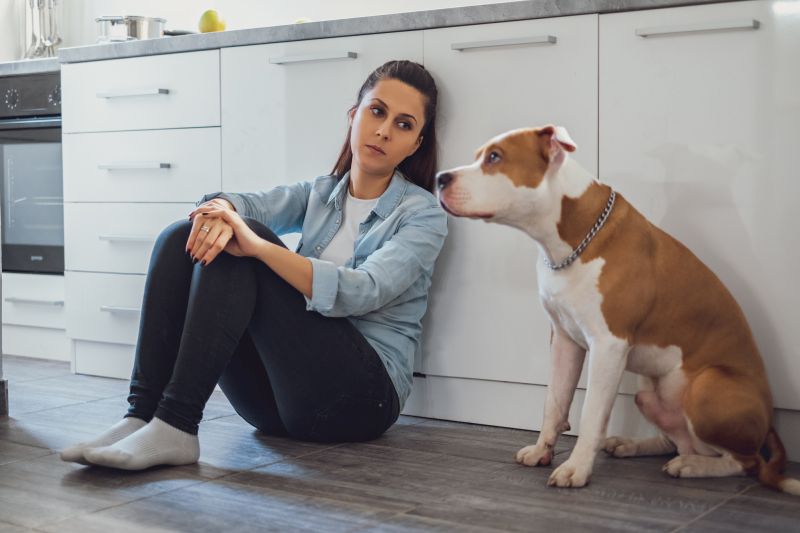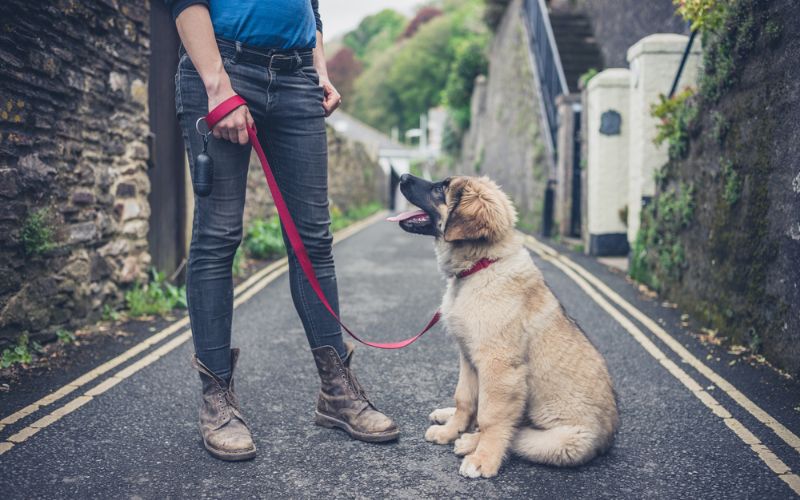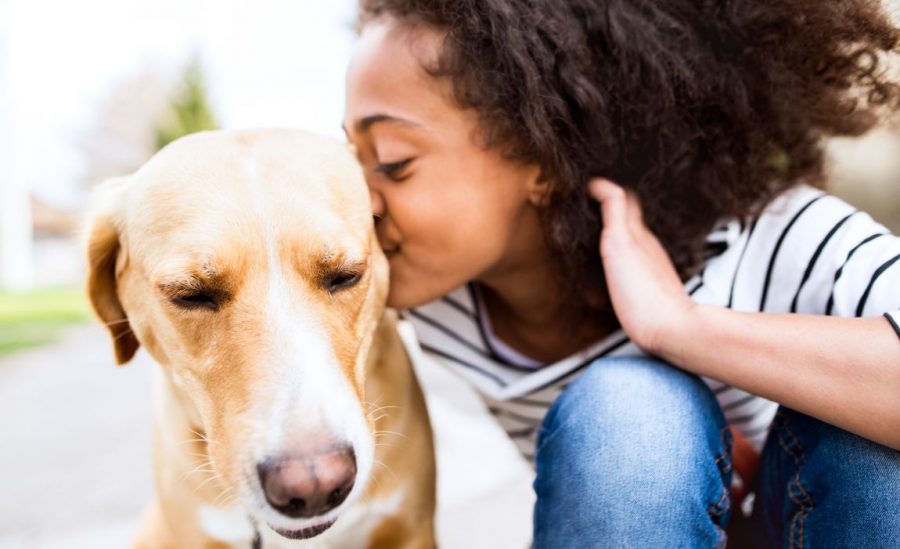Welcoming a new puppy into your home is exciting, but it’s also stressful, leaving some pet parents overwhelmed or downright depressed. Called “the puppy blues,” these feelings are surprising to some, though they are perfectly normal given the major changes a new fur family member brings to your daily routine.
Luckily, there are ways to smooth the bumps in the road of pooch parenthood and return to enjoying life with your new fur baby.
Below, we’ll share signs you’re suffering from the puppy blues and some tips for overcoming them.
Key Takeaways: Dealing with the Puppy Blues
- Lots of new dog owners suffer from the “puppy blues.” Typical symptoms include depression, anxiety, and frustration due to the challenges new puppies present and the ways they change your lifestyle.
- It’s natural to struggle with the pitfalls of pet parenthood. Adding a new puppy to your family is stressful — even for experienced owners. The puppy blues are nothing to be ashamed of.
- There are things you can do to help ease the puppy blues. From reaching out to other owners to hiring professional assistance to re-framing your idea of pet parenthood, there are several things you can do to help you feel better.
Puppy Blue Basics: What Are the “Puppy Blues?”

The puppy blues are bouts of anxiety or depression that happen after bringing home a new dog (usually a puppy).
Sometimes called post-puppy depression, the puppy blues can cause symptoms like second-guessing your decision to get a new pet, struggling to bond with your new pet, and stress. In some cases, you may even consider rehoming your pup.
Note that the name “puppy blues” is a bit of a misnomer, as you can also experience these feelings after adopting an adult doggo.
When Do the Puppy Blues Typically Happen?

Post-puppy depression is most common in the first three weeks after your new dog comes home.
This window is full of the biggest challenges, from housetraining to getting your pup to sleep through the night without crying. That said, puppy blues can occur at any stage of pupper parenthood, particularly when navigating difficult times like fear periods.
How Long Do the Puppy Blues Last?
There’s no set time frame for how long the puppy blues last, but for most pet parents, anxieties and sadness wear off in a few weeks as you and your new dog settle into a routine.
This is also a critical time when your new furry family member adjusts to his new surroundings and can grow comfortable enough to let his personality shine.
The puppy blues can sometimes resurface later, particularly if your puppy is going through training challenges or behavior issues. This is normal and will likely resolve as you and your pup work through the hiccup.
Does Everyone Get the Puppy Blues?

Not everyone gets the puppy blues, but they are common. They’re most likely to strike first-time dog owners struggling with the challenges of pet parenthood.
Still, even seasoned dog owners sometimes need help with the puppy blues, as bringing home a puppy is stressful for everyone, regardless of their experience level.
Do the Puppy Blues Go Away?
The puppy blues are usually temporary.
Raising a puppy is no walk in the park, and it’s normal to feel overwhelmed sometimes, particularly when your pup makes a mega mess or keeps you up all night. It’s reasonable to feel sad about the new lack of freedom, too, but these negative feelings fade in time.
In rare cases, the puppy blues may be you realizing that having a puppy (or dog) just isn’t for you, and that’s OK, too. There’s no shame in admitting what’s best for your mental health and your new puppy’s care.
But when rehoming is a must, make sure you do so responsibly.
A way to avoid this heartbreaking scenario is to foster a dog for a shelter or rescue before adopting or purchasing a puppy of your own. This gives you a temporary taste of pet parenthood without a long-term commitment.
Signs of the Puppy Blues: Is Your Pet Making You Depressed?

The puppy blues aren’t a one-size-fits-all condition, with some pet parents feeling blue while others are frazzled and frustrated. Some owners even experience physical symptoms.
If you’ve experienced any of the following, you may be suffering from the puppy blues:
- Increased irritability
- Resenting your puppy or your decision to bring a puppy home
- Difficulty concentrating
- Increase in headaches, stomach upset, or muscle tension
- Feeling trapped or “stuck” with the puppy or puppy’s needs
- Anxiety
- Feeling overwhelmed
- Numbness
- Guilt or shame
- Helplessness
- Difficulty sleeping unrelated to your puppy’s sleep schedule
- Change in appetite
- Increased crying or feelings of sadness
- Thoughts or fears of the puppy being a mistake
- Strained relationships with housemates
- Thoughts of harming yourself or the puppy
Dial 988 to connect to a mental health professional with the Suicide and Crisis Lifeline if you have thoughts of harming yourself or the puppy.
The puppy blues won’t last forever, and there’s no harm in reaching out to loved ones or professionals if you need help. Sometimes, a little break or sympathetic ear is all you need to get back on track.
What Causes the Puppy Blues?

The puppy blues have plenty of potential triggers and often are a culmination of several stressors weighing you down over time.
Let’s dig into some of the most common causes.
You Have to Change Your Routine

Bringing home a puppy shakes up your schedule from top to bottom. Now, instead of getting ready for work, you must worry about pottying, feeding, and exercising a puppy before tending to your needs and heading out the door.
This schedule change and new demand for time management can spike stress levels.
You Lose Sleep

The first few nights of #puppypawrenthood usually include your new fur friend crying, whining, and barking, often robbing you of precious sleep.
A lack of sleep can leave everyone in the household – furry and human – feeling extra froggy come morning and beyond. Sleep deprivation can also do a number on your overall health if you’re not careful, which may show up as headaches, difficulty concentrating, and even high blood pressure.
You Have More Responsibilities

Gone are the days of impromptu Happy Hour after work once you bring home a puppy. Now, your puppy is waiting on you for potty breaks and feeding. You’re also saddled with pooper scooper duty, training, and more.
All these extra responsibilities add up, leaving you feeling overwhelmed or downright exhausted by the end of the day.
Reality Doesn’t Match Your Expectations

Sometimes, we romanticize the idea of raising a puppy, thinking it’ll be all cuddle sessions, playtime, and rainbows. The reality is that training is hard and that cleaning up poop and pee gets old quickly. Puppy kisses also come with puppy chomps, and your favorite shoes might wind up destroyed.
Ditching the rose-colored glasses and navigating the trenches of pupper parenthood is tough work. This is usually when many pawrents panic a little, wondering if they made the right choice.
Puppies May Exacerbate Existing Health Struggles

The stress of bringing home a new dog can amplify existing health concerns, such as anxiety, tension headaches, and depression. Your system is forced to adapt to a change in routine, interrupted sleeping schedule, and added responsibilities, which is tough for anyone to deal with, but especially for those already struggling with physical or mental health.
You Experience Common Dog-Rearing Problems

A new pup comes with a mountain of potential problems to work through that can add up over time, from surprise poop on the carpet to a shredded passport a week before you fly to Barcelona. There are also the bouts of nuisance barking, tooth marks in your furniture, and leash-biting bonanzas.
Training and growing aren’t linear, either, with puppies often going through fear periods and regressions that leave owners flustered.
Puppies Can Cause Financial Struggles

From purchasing a puppy crate to stocking up on chews, a new fur friend needs a lot of gear that can wallop your budget, and that doesn’t even include vet visits for vaccinations or grooming appointments for furrier friends.
Coupled with needing more cleaning supplies for housetraining happenings or replacing things your chew-happy puppy damages, it may feel like your money’s flying out the window, sending your stress levels through the roof.
Your Puppy Isn’t Getting Along with Your Current Pets

Multi-pet families may face headaches when introducing a puppy to an older dog or getting a puppy and cat to get along. Sometimes, the process is smooth, and the two hit it off, but other times, it can take days or weeks for your pets to adjust.
In rare cases, your fur friends may remain foes for longer or even permanently.
17 Tips for Dealing with the Puppy Blues

The puppy blues may leave you feeling hopeless, but there are ways to combat this fog of Fido fatigue and uncertainty, from connecting with the greater canine community to modifying your mindset.
Don’t shy away from mixing and matching what works best for you. Overcoming the puppy blues is a unique process for every pet parent.
1. Ask for help.

Leaning on friends and family can help during rough patches of puppy parenthood. This is especially true if you’re in a multi-person household where others can pick up some canine chores that are running you ragged.
Asking pup parents you know for advice may also help solve common canine conundrums, such as getting your puppy to pee on a leash or finding a good groomer in your area. If you need a break, ask a friend to come over for a puppy sleepover with your bundle of barkin’ joy.
Sometimes, all it takes is a night of good sleep to feel refreshed.
2. Seek out paid help.

Don’t have a pup-friendly pal or family nearby to give you a helping hand? Hire someone!
Dog walkers are worth their weight in gold for exercising puppies in a pinch, as are doggy daycare services that look after your puppy while you work. Some dog walkers and daycares offer feeding service, too, making sure your doggo’s dinner is served on time if you want to head to Happy Hour after work.
Trainers are another critical support point when rearing a new pup, especially if you’re struggling to master obedience basics with your puppy. In some cases, a dog behaviorist may be necessary to get resident dogs to accept your new furry family member or if you’re concerned you have an aggressive puppy.
3. Get more exercise (both of you!).

Sometimes, the best medicine for you and your barker is to move. Like adult doggos, puppy behavior problems often stem from a lack of canine enrichment, leading to everything from nuisance barking to destructive chewing.
Walk your puppy enough daily and work in one-on-one play, such as rounds of fetch, to put his brain and body to work. You can also introduce your pupper to your favorite forms of exercise, like hiking.
Exercise also aids in treating anxiety and depression in humans, making it a solid choice in battling the puppy blues.
4. Bond with your barker through fun, new activities.

It’s easy to get caught up in the “work” part of pet parenthood and lose sight of the fun. Why not throw together a batch of homemade training treats to pamper your pupper? Your little one will surely appreciate sampling the fruits of your labor, and it offers a chance to bake up memories together. You can also make a puppy pawprint ornament to cherish year after year as your fur kiddo grows.
Another fun way to bond with your new puppy is to explore activities he’ll excel at. A prime example is nosework games for scent hounds. Every puppy can have tail-wagging fun with dog walking games, too.
5. Make a muttastic memory book.

No matter how challenging they can be, the puppy days fly by and are over before you know it. An excellent way to reflect on the good times (and memorialize them) is through a memory book.
Jot down your favorite mutt memories, from the first time your cutie barked to how you came up with his name, and add pictures to bring the book to life.
Feeling extra creative? Try a puppy photo shoot, complete with poses and props.
Want to rock your dog’s next photo shoot? Check out some dog photography tips to nail the perfect shot of your sniffer.
6. Connect with other owners.

The canine community is overflowing with knowledge and support you can tap into anytime. Your dog park friends may have tips and tricks for nailing obedience basics, while online forums are packed with solutions for destructive chewing and other puppy quirks.
Another option is to look for local puppy playgroups if you’re simply after companionship with other puppy parents. These groups are great for socializing your puppy, letting off steam, and laughing with other pet parents over common puppy-rearing problems.
Reaching out helps solidify that you’re not alone in your struggles. Everyone has days when their puppy is too much to handle – even experts!
7. Do some homework.

Learning about your dog’s breed can help you understand why he does what he does. It can also help you feel more connected to your canine.
A little homework can also uncover why certain training methods work or don’t work with your Rover. This is especially true of independent dog breeds. You can also learn breed-specific quirks to watch for, like a basenji’s knack for climbing chain link fences or a Labrador’s unstoppable appetite.
Researching puppy care basics and common behaviors can also help you determine if your pooch’s issues, such as frequent whining, are normal or something more serious, like separation anxiety.
8. Explore dog training resources.

There are countless training resources to dig into if you don’t have the funds or desire to hire a professional dog trainer.
Some of the best are dog training books that dive into puppy basics like housetraining, loose leashing walking, and positive reinforcement dog training. These can be vital in understanding the reasons your dog isn’t listening to you.
9. Adjust your expectations.

Puppies will be, well, puppies. Internalizing this fact will often go a long way toward easing the puppy blues.
Remember: Your puppy is a baby learning the world around him one day at a time (usually by using his mouth as a guide).
A little mischief is to be expected during puppyhood. Also, it takes time for your new buddy to master pottying outside, sleeping in a strange new place, and gnawing chew toys instead of fingers.
And don’t forget to laugh! While it’s sometimes hard, maintaining a sense of humor goes a long way in dealing with puppy shenanigans.
10. Journal your thoughts and feelings.

Many puppy parents have found that putting some thoughts and concerns down on paper (or screen) can help sort anxiety from real, tangible concerns. It’s also just plain old beneficial to get your feelings out – good or bad.
Journals can be valuable points of reflection as well, giving you insight into your growth as a pet parent over time.
11. Cut yourself some slack.

Loosen the leash and stop being so hard on yourself! All too often, as dog owners, we expect perfection out of ourselves, but the reality is that raising a puppy is hard as hell, every dog is unique, and sometimes, we make mistakes. A little grace is warranted.
Even experienced pet parents have off days or get overwhelmed. You’re human.
12. Schedule some “me” time.

When was the last time you dined out with a friend or had time out without worrying about your woofer? Maintaining your social life and self-pampering time is critical for new puppy parents. You don’t stop being a person the minute you become a dog owner. You have needs, too.
Carve out time for puppy-free activities, whether popping out for a pedicure or grabbing a coffee and croissant. Your puppy will be OK for a few hours while you enjoy some much-deserved R&R.
13. Budget for your barker.

Everyday expenses add up, and it’s easy to go overboard when shopping for your new fur kiddo, so budgeting for your dog is a must to stay ahead of the financial curve of canine companionship. Budgeting alleviates stress and gives you control of the situation, potentially calming anxiety.
Another potential cost saver to consider is pet insurance. While requiring ongoing premiums, pet insurance can save puppy owners thousands of dollars if your floof gets sick or injured (if you select the right kind of plan).
14. Talk to a therapist.

Seeking help from a mental health professional is a great way to work through the puppy blues and other stresses in your life. Sometimes, the puppy blues are merely a symptom of an overall issue, like stretching yourself too thin between work and home. Other times, underlying anxiety is to blame.
Either way, a therapist is trained to provide coping mechanisms for overcoming life’s hurdles, including the puppy blues.
15. Invest in tools.

Raising a puppy is much easier when you have the right gear at your disposal, and no, you don’t need to break the bank to get them, either.
Have housetraining problems? Try dog pee pads or a real grass potty patch. Need a place to stash those yummy training treats during lessons? Look into training treat pouches. Want a place where your puppy can exercise without destroying everything in sight? Consider a dog playpen.
Just about every puppy problem – big or small – has a solution. Chances are someone’s thought of a product to make it easier, too.
16. Dig into doggo DIY.

Not everything your dog needs has to be bought in a shop. Opting to make items at home can save you serious doggy dollars. Whether you’re handy enough with a hammer to build a DIY dog house or ready to brew DIY dog shampoo (speaking of DIY doggo brewing…), there’s a dog DIY project out there that can bolster your budget.
Another great way to save canine coins is to do certain things yourself rather than contracting out to a professional. One way is to do your own grooming. Sure, you’ll need to purchase grooming tools upfront, but you’ll likely save on grooming costs in the long run.
17. Make learning fun.

Training doesn’t need to be dull, with dog training games and dog training toys making your doggo’s lessons more enjoyable for you both. Introducing fun helps avoid repetition, something that any dog (especially the smartest ones) will tire of quickly.
You can also incorporate fun and play into everyday learning. Crate training games are a great way to build up your canine’s confidence with being in his crate, for instance.
The Puppy Blues: FAQ

Battling the puppy blues isn’t easy, so you may still have lingering concerns. Browse the most frequently asked questions about the puppy blues and the matching answers with us.
How long do the puppy blues last for?
Every person is unique, but the puppy blues generally last a few days or weeks. With that in mind, the puppy blues can recur briefly as your puppy enters fear periods or exhibits new problem behaviors.
How do you get rid of the puppy blues?
Everyone overcomes post-puppy depression differently, but the best way is to use a multi-pronged approach where you make sure your physical and mental health needs are being met, ask for help from friends, family, and professionals when needed, and give you and your doggo some slack in figuring out life together. Some pet parents also find a mental health professional’s assistance beneficial. The most important thing is to do what works best for YOU.
What’s the hardest stage of having a puppy?
The most challenging stage of bringing home a puppy is the first days and weeks together. During this period, you and your puppy are adjusting to a new “normal” and tackling heavy-duty challenges like housetraining and sleeping through the night. It’s when you’re tasked with cleaning up waste and fine-tuning your schedule to match you and your Rover’s needs, often leaving you sleep-deprived and stressed.
What can you do when you’re overwhelmed by a puppy?
Scheduling “me” time is a quick way to regain some sanity, but reaching out to friends or family for a puppy sleepover is even better if you need to catch up on sleep. Another approach is to hire help, such as a dog trainer for training woes or a dog walker for exercising and pottying your puppy while you’re at work.
Is it OK to rehome a puppy if you have puppy blues?
When all else fails, it’s OK to rehome a puppy if it’s in the best interest of one of you. While not ideal, sometimes, your mental health demands a break, or your puppy’s needs don’t work with your lifestyle. What’s most important here is acknowledging that puppy ownership isn’t for you and not simply replacing the puppy with another and starting the sad process over again.
The puppy blues can strike any pet parents, but these snaps of sadness and stress are often short-lived. With a few adjustments, you can be back to enjoying your doggo in no time.
Have you battled the puppy blues before? Do you have any tips or tricks for pet parents trying to overcome post puppy depression? Tell us about your experience in the comments.














Leave a Comment